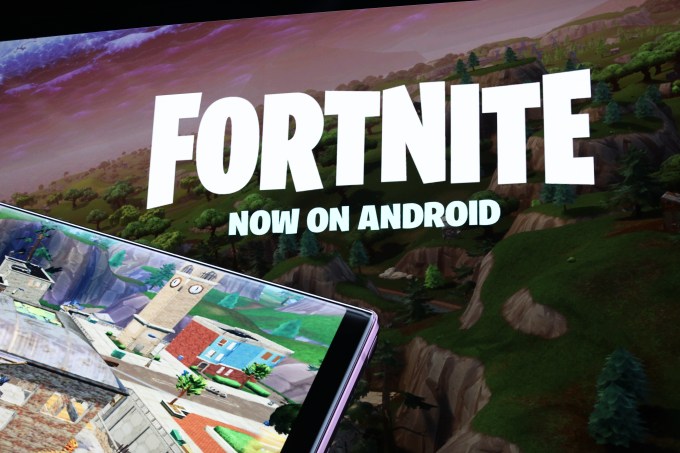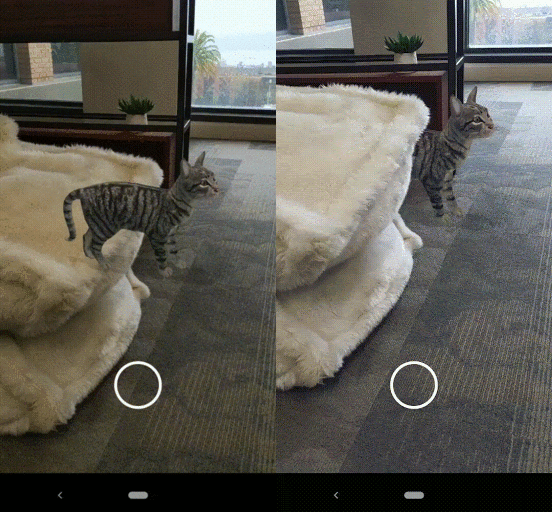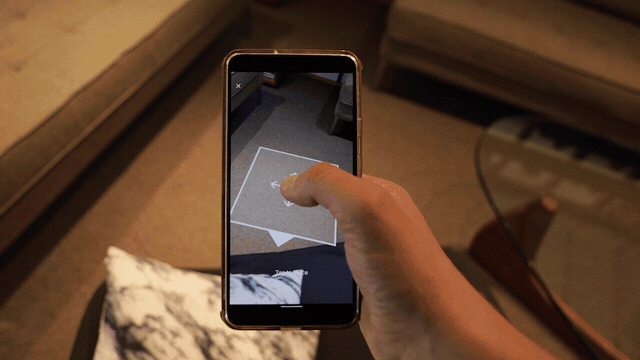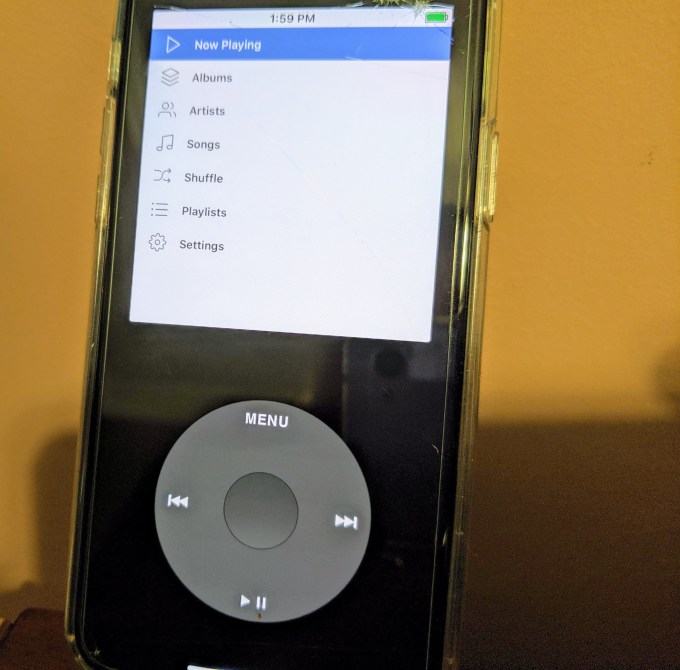Welcome back to This Week in Apps, the Extra Crunch series that recaps the latest OS news, the applications they support and the money that flows through it all.
The app industry is as hot as ever, with 194 billion downloads last year and more than $100 billion in consumer spending. People spend 90% of their mobile time in apps and more time using their mobile devices than watching TV. Apps aren’t just a way to waste idle hours — they’re big business, and one that often seems to change overnight.
In this Extra Crunch series, we help you to keep up with the latest news from the world of apps.
This week, we’re taking a look at Apple Arcade’s new gaming franchise, Fortnite maker Epic Games calling out the Google Play Store for its monopolistic practices, Android’s new AR features, Disney+’s one-month app footprint, and more.
Headlines
Apple Arcade scores a big sports game franchise, “Ultimate Rivals”

Apple Arcade launched in September offering over 100 games for $4.99 per month. Since launch, the service stays fresh by adding new releases on a regular basis. This week, Apple touted one of Arcade’s biggest wins to date — an all-new sports franchise from Bit Fry Game Studios, called “Ultimate Rivals.” The new game brings together athletes from across hockey, basketball, football, baseball, and soccer to play in a licensed video game that’s a first for the mobile gaming industry. The debut title in the franchise, out now on Apple Arcade, is “Ultimate Rivals: The Rink,” which lets players choose from over 50 athletes to compete in two-on-two hockey matches.
For example, you could pit Alex Ovechkin and Alex Morgan against De’Aaron Fox and Jose Altuve or Skylar Diggins-Smith and Wayne Gretzky, Apple says.
The game was made possible by Bit Fry’s groundbreaking licensing deals with nine pro sports organizations, the NHL, NHL Players’ Association (NHLPA), NBA, National Basketball Players Association (NBPA), MLB, MLB Players Association (MLBPA), NFL Players Association (NFLPA), Women’s National Basketball Players Association (WNBPA), the USWNTPA, as well as Wayne Gretzky.
Next spring, the Bit Fry will launch “Ultimate Rivals: The Court” as the next title in the series.
The franchise is a big win for Apple Arcade, which doesn’t yet have many sports-themed titles. In fact, with the addition of “Ultimate Rivals,” it now has only a half dozen. And because of the numerous pro sports deals, the game has the potential to appeal to a wider audience.
Fornite tries to bypass the Google Play Store’s 30% cut

Some would say Apple’s App Store and Google Play are monopolies that have too much power as the only gateway to their respective app ecosystems. The companies, of course, would disagree. Now, some app publishers are taking advantage of the increased regulatory scrutiny to make the case that these marketplaces are asking for too hit a cut of their revenues. (The commissions range from 15%-30%, the lower percentage for subscriptions in their second year and beyond).
This week, Fortnite maker Epic Games pulled a stunt designed to garner press attention by submitting its popular game to Google’s Play Store that used its own payments platform, “V-Bucks.” As you may recall, Fortnite famously sidestepped the Play Store at launch, forcing users to sideload its app instead. In October, it rebranded the installer app to “Epic Games,” a signal that Epic could be planning to launch its own games store on Android as it did with its Steam rival, the Epic Games Store for PCs.
But the company clearly knows the value of being listed in one of the world’s biggest app marketplaces — it just doesn’t want to give up millions in revenue for the privilege. Of course Epic Games knew Google wouldn’t cave on its demands (it didn’t), but the game maker wanted a way to go public with the following statement, attributed to CEO Tim Sweeney (see below):
Epic doesn’t seek a special exception for ourselves; rather we expect to see a general change to smartphone industry practices in this regard.
We have asked that Google not enforce its publicly stated expectation that products distributed through Google Play use Google’s payment service for in-app purchase. We believe this form of tying of a mandatory payment service with a 30% fee is illegal in the case of a distribution platform with over 50% market share.
We note that Google Play’s Developer Distribution Agreement (https://play.google.com/about/developer-distribution-agreement.html) does not require developers use Google payments. It merely references a number of non-contractual documents asking developers to do so.
Further, Epic operates a major PC storefront and payment service and we do not force developers using our store to use our payment ecosystem.
Google surely doesn’t like the fact that Epic Games is taking a stand against Play Store while distributing the app on iOS and using Apple’s Billing System to do so. Google also made sure to point out the scale of its operation, with 2.5 billion active Android devices that collectively download 116 billion apps per year. And like Apple, Google also launched a micro-site dedicated to promoting its position that its marketplace has value. (And isn’t, ahem, monopolistic.)
Google shows off new AR features for apps and web

Google this week unveiled some of the latest updates to ARCore, its developer platform for building augmented reality (AR) experiences. A new ARCore Depth API will allow developers to use the depth-from-motion algorithms to create a depth map from a single RGB camera. The depth map is created by taking multiple images fro different angles and comparing them, as you move your phone around.
This will help AR developers perform occlusion — which makes digital objects seem more real by blending them in with the scene, either in front of or behind real-world objects. Occlusion this week was made available in Scene Viewer, the developer tool that powers AR in Search, to an initial set of over 200 million ARCore-enabled Android devices, Google said.

A debut partner taking advantage of the upgrade is Houzz, which is using the Depth API for its “View in My Room 3D” experience in its app. Google also tested other ideas using occlusion, like game mechanics were objects bounce and splash across surfaces, or those where players duck and hide characters behind real-world objects. Interested developers who want to try the new Depth API, are being directed to this form.
Disney+’s app footprint
It’s one month after the launch of Disney’s Netflix rival, Disney+. And while the company has shared some numbers related to its quick adoption — like its 10+ million signups on launch day — it hasn’t yet shared how many are paid or free users or how large its install base has grown. One app analytics firm, Apptopia, thinks it has an idea, at least in terms of mobile users. The firm estimates Disney+ mobile app was installed 22 million times in the four-week period following its launch. It also estimates $20 million in in-app purchase revenue, and 9.5 daily active users.
However, another firm’s estimates are much higher. According to Sensor Tower, the app was installed 28 million times, with 4 million mobile users converting from the free trial to paid subscribers. It also estimates the subscribers have spent an estimated $55 million to date, with U.S. subscribers accounting for 86% of that spending. That figure is much, much bigger than other streaming competitors in their first month, including even HBO.
Quick bites
- iOS 13.3 Arrives: Here’s everything you need to know about iOS 13.3 courtesy of iMore.
- iOS 13.3 Bug: Oops, don’t tell your kids how easy it is to bypass the new Screen Time Communication Limits in iOS 13.3. Apple says it’s going to fix the bug, which only occurs on devices with a “non-standard configuration.”
- Apple acquisition: Apple just bought a U.K. machine learning startup, Spectral Edge, focused on improving smartphone photography — specifically, colors in photos. Because better cameras and photos are now the only reasons to upgrade from a really good iPhone to another really good iPhone. Well, that and color choice.
- Antitrust reckoning: The FTC may prevent Facebook from further integrating its apps, including Facebook, Instagram, Messenger, WhatsApp. So much for that cross-platform messaging system?
- Missing receipts: Some Apple customers say they’re missing email receipts for App Store purchases.
- Google Analytics improve: Google’s new App + Web properties in Google Analytics will support multiple web streams, including Firebase web apps, in a single property. It can go up to 50 data streams across apps, websites, and web apps. Also added are more options for custom analysis, cohort analysis and user lifetime, as well as an update to the existing pathing technique and a larger window for historical data. The updates hit in a few weeks.
- App Acquisitions: Via Apptopia.com, Woowa Brothers, a food delivery company in Southeast Asia, is being bought by Delivery Hero for $4B. London’s Gumbug has been acquired by hypercasual game publisher, Voodoo. Eipix Entertainment has been acquired by Playrix, maker of Gardenscapes and others.
- YouTube is making bank: YouTube’s mobile app has topped $1 billion in revenue from in-app subscriptions, Sensor Tower reports, making it one of just 7 non-game apps to do so since 2012. The $563.5 million YouTube has generated worldwide, year-to-date, is double the amount grossed over all of 2018, with Q3 2019’s $164 million revealing 87% annual growth.
- BMW says ‘ja’ to Android Auto: It’s joining CarPlay, starting in July 2020.
- Swipe right for $$$: Tinder made the most money ($82+ million) out of all non-game apps worldwide in November.
- Goodbye Wunderlist: Microsoft for years promised it would eventually shut down to-do list app Wunderlist, which it acquired in 2015, in favor of its own app, To Do. Now, Microsoft has finally announced a shut-down date for Wunderlist of May 6, 2020.
- Anti-Instagram, VSCO, gets a spotlight: TechCrunch’s Kate Clark profiles VSCO, the Gen Z approved photo app.
Downloads
Rewound

A clever music player app turns your iPhone into an iPod, complete with a click wheel nav. But what’s interesting is how Louis Anslow of Rethought agency, sneaked this into the App Store, given the seemingly infringing use of the iPod’s UI. As it turns out, the app itself comes with a basic interface that users mod after they download. That means the app itself doesn’t infringe nor do its contents include any Apple iPod skins. Instead, users are directed to Twitter to locate these items after download, then apply them to the otherwise unadorned app. That means you could apply other, non-iPod skins too, of course. But no one is doing that. It’s an iPod as an app. The concept is not unique. Rewound just beat developer Elvin Hu, who’s making something similar, to the App Store.
Trash
Facetune, Faceapp, Englight and a host of others tapped into the power of A.I. to retouch photos to make them Instagram-worthy. The next trend is turning to A.I. to automate video creation, to make your video clips TikTok-worthy. The App Store’s “App of the Day” on Friday was in this genre, in fact. Apple’s pick, Spark Camera, lets you tap, tap, tap to record video which the app then helps you rearrange and filter.
For something even easier, there’s Trash. TechCrunch profiled the app when it launched in January into private beta. But now the app is open to the public. And it’s pretty great. You just select some clips you want combined, and Trash puts them together in a creative way. You can also edit the video speed and the vibe by picking the music, then share wherever you want.
The app doesn’t offer its own feed, but does have some videos you can save to your Camera Roll to add to your own edits.
Despite its advanced computer vision techniques, the challenge for Trash now will be able to stand out from the wide world of video editing apps that largely serve as tools to use before uploading to TikTok and other social media platforms, like Zoomerang, Likee, InShot, Bee Cut, Magisto, Funimate, Vizmato, Videoleap, PicsArt, and many others.
Tweet of the Week:
Where did BetterMe go? Unclear. Requests for comment to Apple and the developer have been met with silence. But these angry user reviews about subscription abuse could mean the app was pulled by Apple.
This was a big moneymaker. Sensor Tower says the app has been installed 40M times on iOS and users spent more than $85M in their apps. The most popular, BetterMe: Weight Loss Workout, was last ranked at No. 5 in the Health & Fitness category on the U.S. App Store. It was No. 1 in 6 countries and top 10 in 39 before removal. It was also in the top 10 for iPhone revenue in 61 countries before it was removed.